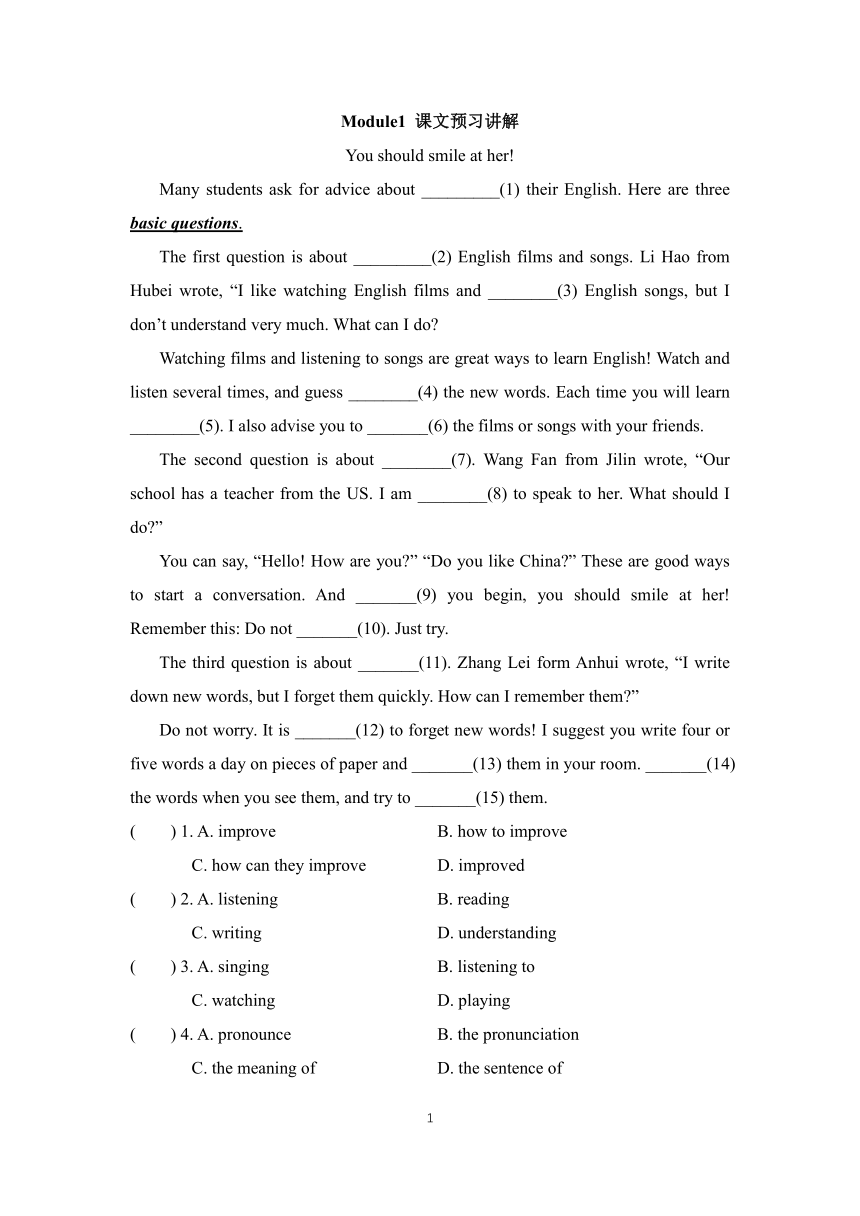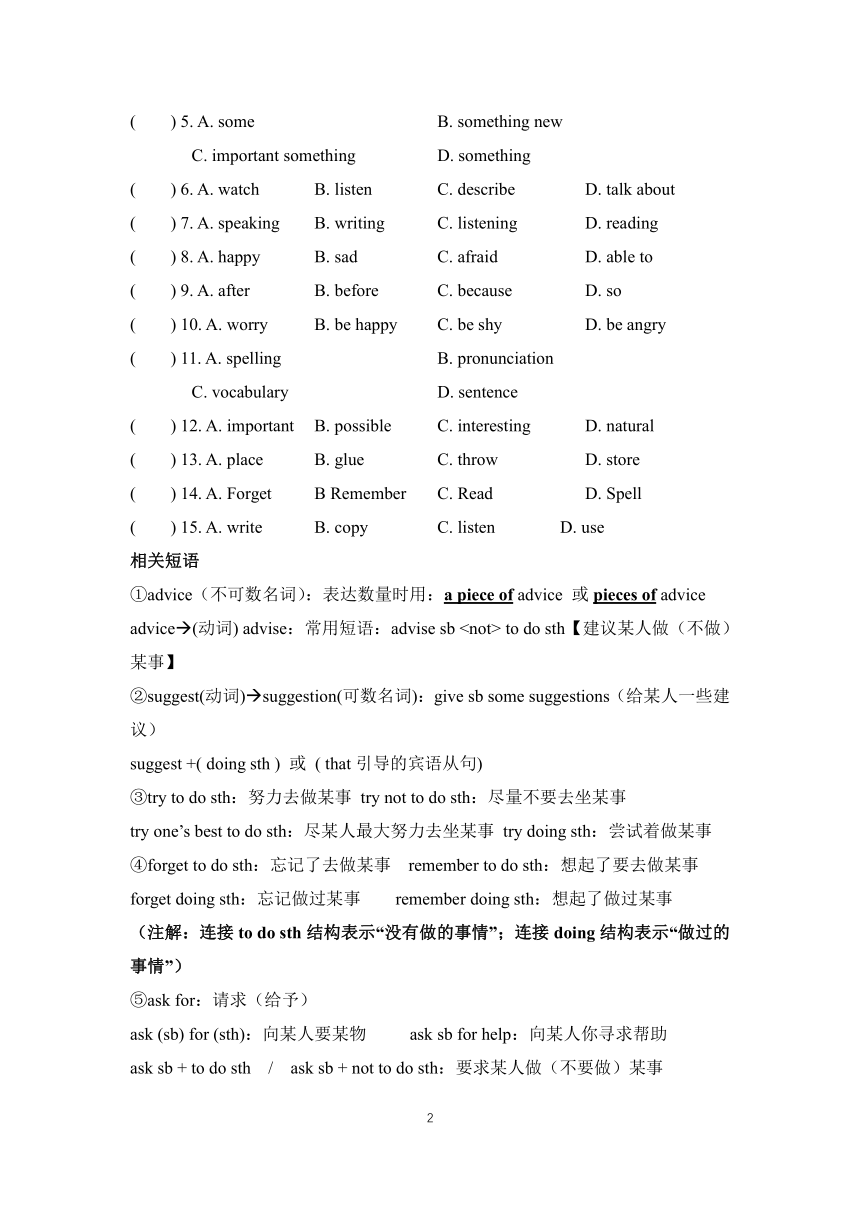外研版八年级英语上册 Module 1 How to learn English>课文预习讲解(WORD版)
文档属性
| 名称 | 外研版八年级英语上册 Module 1 How to learn English>课文预习讲解(WORD版) |  | |
| 格式 | docx | ||
| 文件大小 | 24.4KB | ||
| 资源类型 | 教案 | ||
| 版本资源 | 外研版 | ||
| 科目 | 英语 | ||
| 更新时间 | 2022-06-23 18:04:51 | ||
图片预览


文档简介
Module1 课文预习讲解
You should smile at her!
Many students ask for advice about _________(1) their English. Here are three basic questions.
The first question is about _________(2) English films and songs. Li Hao from Hubei wrote, “I like watching English films and ________(3) English songs, but I don’t understand very much. What can I do
Watching films and listening to songs are great ways to learn English! Watch and listen several times, and guess ________(4) the new words. Each time you will learn ________(5). I also advise you to _______(6) the films or songs with your friends.
The second question is about ________(7). Wang Fan from Jilin wrote, “Our school has a teacher from the US. I am ________(8) to speak to her. What should I do ”
You can say, “Hello! How are you ” “Do you like China ” These are good ways to start a conversation. And _______(9) you begin, you should smile at her! Remember this: Do not _______(10). Just try.
The third question is about _______(11). Zhang Lei form Anhui wrote, “I write down new words, but I forget them quickly. How can I remember them ”
Do not worry. It is _______(12) to forget new words! I suggest you write four or five words a day on pieces of paper and _______(13) them in your room. _______(14) the words when you see them, and try to _______(15) them.
( ) 1. A. improve B. how to improve
C. how can they improve D. improved
( ) 2. A. listening B. reading
C. writing D. understanding
( ) 3. A. singing B. listening to
C. watching D. playing
( ) 4. A. pronounce B. the pronunciation
C. the meaning of D. the sentence of
( ) 5. A. some B. something new
C. important something D. something
( ) 6. A. watch B. listen C. describe D. talk about
( ) 7. A. speaking B. writing C. listening D. reading
( ) 8. A. happy B. sad C. afraid D. able to
( ) 9. A. after B. before C. because D. so
( ) 10. A. worry B. be happy C. be shy D. be angry
( ) 11. A. spelling B. pronunciation
C. vocabulary D. sentence
( ) 12. A. important B. possible C. interesting D. natural
( ) 13. A. place B. glue C. throw D. store
( ) 14. A. Forget B Remember C. Read D. Spell
( ) 15. A. write B. copy C. listen D. use
相关短语
①advice(不可数名词):表达数量时用:a piece of advice 或pieces of advice
advice(动词) advise:常用短语:advise sb to do sth【建议某人做(不做)某事】
②suggest(动词)suggestion(可数名词):give sb some suggestions(给某人一些建议)
suggest +( doing sth ) 或 ( that引导的宾语从句)
③try to do sth:努力去做某事 try not to do sth:尽量不要去坐某事
try one’s best to do sth:尽某人最大努力去坐某事 try doing sth:尝试着做某事
④forget to do sth:忘记了去做某事 remember to do sth:想起了要去做某事
forget doing sth:忘记做过某事 remember doing sth:想起了做过某事
(注解:连接to do sth结构表示“没有做的事情”;连接doing结构表示“做过的事情”)
⑤ask for:请求(给予)
ask (sb) for (sth):向某人要某物 ask sb for help:向某人你寻求帮助
ask sb + to do sth / ask sb + not to do sth:要求某人做(不要做)某事
⑥be afraid of sb (sth):害怕某人或某物(指由于担心出现严重后果而害怕)
be afraid + to do sth:害怕去做某事(指胆小而害怕)
be afraid + that从句:恐怕……
单词、短语用法辨别:
1. each的用法
(考点)放在句首“Each of….”通常作为“三单”形式,后边的谓语动词也搭配“三单”形式。如放在复数名词之后使用,一般不再看作“三单”形式
2. something new的用法
(考点)“some / any / every / no+其他单词”组成的合成词叫不定代词;修饰不定
代词的形容词要放在不定代词后面,这种用法是不定代词定语后置
3. need:需要
(考点):① need:作为实意动词need to do sth(需要做某事),并且否定句和疑问句都是借助助动词“don’t + need to do sth / Do +……+need to do sth ”来完成的。
② need:作为情态动词need + do sth(需要做某事),并且否定句和疑问句都是通过need的变化来完成(needn’t + do sth / Need +……+do sth )
③以“Must”为开头的一般疑问句,否定回答用“needn’t或don’t have to”,不用“mustn’t”
4. else / other / another / the other的辨别使用:
(考点)① else:别的,其他的通常用在疑问词或不定代词后边使用
other:其他的修饰名词,通常放在名词前边使用
② other:指“其他的一些”,other+复数名词= others(缩写形式)
the other:指“其他的全部”, the other +复数名词= the others(缩写形式)
③ another:指“三者或以上”当中的另一个,another+单数名词
the other:指“两者”当中的另一个,one is…… the other is……:一个……另一个……
相关句型讲解:
1. How about…… ……怎么样?
(考点)①How about…… = What about……( + doing sth)
②表达一种提建议的语气,同义句有:
How about…… = Why not do sth / Let’s do sth. / Shall we do sth
= Would you like to do sth
③回答的答语一般有:Good idea. / That’s a good idea. / Great
2. 形式主语+真实主语句型
(考点):① It + ( is +形容词) + to do sth. 做某事是……样子的。
② It + ( is +形容词) + for sb/ (of sb) + to do sth. 对某人来说做某事是……样子的。
1
You should smile at her!
Many students ask for advice about _________(1) their English. Here are three basic questions.
The first question is about _________(2) English films and songs. Li Hao from Hubei wrote, “I like watching English films and ________(3) English songs, but I don’t understand very much. What can I do
Watching films and listening to songs are great ways to learn English! Watch and listen several times, and guess ________(4) the new words. Each time you will learn ________(5). I also advise you to _______(6) the films or songs with your friends.
The second question is about ________(7). Wang Fan from Jilin wrote, “Our school has a teacher from the US. I am ________(8) to speak to her. What should I do ”
You can say, “Hello! How are you ” “Do you like China ” These are good ways to start a conversation. And _______(9) you begin, you should smile at her! Remember this: Do not _______(10). Just try.
The third question is about _______(11). Zhang Lei form Anhui wrote, “I write down new words, but I forget them quickly. How can I remember them ”
Do not worry. It is _______(12) to forget new words! I suggest you write four or five words a day on pieces of paper and _______(13) them in your room. _______(14) the words when you see them, and try to _______(15) them.
( ) 1. A. improve B. how to improve
C. how can they improve D. improved
( ) 2. A. listening B. reading
C. writing D. understanding
( ) 3. A. singing B. listening to
C. watching D. playing
( ) 4. A. pronounce B. the pronunciation
C. the meaning of D. the sentence of
( ) 5. A. some B. something new
C. important something D. something
( ) 6. A. watch B. listen C. describe D. talk about
( ) 7. A. speaking B. writing C. listening D. reading
( ) 8. A. happy B. sad C. afraid D. able to
( ) 9. A. after B. before C. because D. so
( ) 10. A. worry B. be happy C. be shy D. be angry
( ) 11. A. spelling B. pronunciation
C. vocabulary D. sentence
( ) 12. A. important B. possible C. interesting D. natural
( ) 13. A. place B. glue C. throw D. store
( ) 14. A. Forget B Remember C. Read D. Spell
( ) 15. A. write B. copy C. listen D. use
相关短语
①advice(不可数名词):表达数量时用:a piece of advice 或pieces of advice
advice(动词) advise:常用短语:advise sb
②suggest(动词)suggestion(可数名词):give sb some suggestions(给某人一些建议)
suggest +( doing sth ) 或 ( that引导的宾语从句)
③try to do sth:努力去做某事 try not to do sth:尽量不要去坐某事
try one’s best to do sth:尽某人最大努力去坐某事 try doing sth:尝试着做某事
④forget to do sth:忘记了去做某事 remember to do sth:想起了要去做某事
forget doing sth:忘记做过某事 remember doing sth:想起了做过某事
(注解:连接to do sth结构表示“没有做的事情”;连接doing结构表示“做过的事情”)
⑤ask for:请求(给予)
ask (sb) for (sth):向某人要某物 ask sb for help:向某人你寻求帮助
ask sb + to do sth / ask sb + not to do sth:要求某人做(不要做)某事
⑥be afraid of sb (sth):害怕某人或某物(指由于担心出现严重后果而害怕)
be afraid + to do sth:害怕去做某事(指胆小而害怕)
be afraid + that从句:恐怕……
单词、短语用法辨别:
1. each的用法
(考点)放在句首“Each of….”通常作为“三单”形式,后边的谓语动词也搭配“三单”形式。如放在复数名词之后使用,一般不再看作“三单”形式
2. something new的用法
(考点)“some / any / every / no+其他单词”组成的合成词叫不定代词;修饰不定
代词的形容词要放在不定代词后面,这种用法是不定代词定语后置
3. need:需要
(考点):① need:作为实意动词need to do sth(需要做某事),并且否定句和疑问句都是借助助动词“don’t + need to do sth / Do +……+need to do sth ”来完成的。
② need:作为情态动词need + do sth(需要做某事),并且否定句和疑问句都是通过need的变化来完成(needn’t + do sth / Need +……+do sth )
③以“Must”为开头的一般疑问句,否定回答用“needn’t或don’t have to”,不用“mustn’t”
4. else / other / another / the other的辨别使用:
(考点)① else:别的,其他的通常用在疑问词或不定代词后边使用
other:其他的修饰名词,通常放在名词前边使用
② other:指“其他的一些”,other+复数名词= others(缩写形式)
the other:指“其他的全部”, the other +复数名词= the others(缩写形式)
③ another:指“三者或以上”当中的另一个,another+单数名词
the other:指“两者”当中的另一个,one is…… the other is……:一个……另一个……
相关句型讲解:
1. How about…… ……怎么样?
(考点)①How about…… = What about……( + doing sth)
②表达一种提建议的语气,同义句有:
How about…… = Why not do sth / Let’s do sth. / Shall we do sth
= Would you like to do sth
③回答的答语一般有:Good idea. / That’s a good idea. / Great
2. 形式主语+真实主语句型
(考点):① It + ( is +形容词) + to do sth. 做某事是……样子的。
② It + ( is +形容词) + for sb/ (of sb) + to do sth. 对某人来说做某事是……样子的。
1
同课章节目录
- Module 1 How to learn English
- Unit 1 Let's try to speak English as much as possi
- Unit 2 You should smile at her.
- Unit 3 Language in use .
- Module 2 My home town and my country
- Unit 1 It's taller than many other buildings.
- Unit 2 Cambridge is a beautiful city in the east o
- Unit 3 Language in use .
- Module 3 Sports.
- Unit 1 Nothing is more exciting than playing tenni
- Unit 2 This year we training more carefully.
- Unit 3 Language in use .
- Module 4 Planes, ships and trains .
- Unit 1 He lives the farthest from school.
- Unit 2 What is the best way to travel.
- Unit 3 Language in use .
- Module 5 Lao She Teahouse.
- Unit 1 I wanted to see the Beijing Opera.
- Unit 2 It descibes the changes in Chinese society.
- Unit 3 Language in use .
- Module 6 Animals in danger.
- Unit 1 It allows people to get closer to them .
- Unit 2 The WWF is working hard to save them all.
- Unit 3 Language in use .
- Revision module A
- Module 7 A famous story
- Unit 1 Alice was sitting with her sister by the ri
- Unit 2 She was thinking about her cat.
- Unit 3 Language in use .
- Module 8 Accidents
- Unit 1 While the car were changing to red, a car s
- Unit 2 I was trying to pick it up when it bite me
- Unit 3 Language in use .
- Module 9 Population
- Unit 1 The population of China is about 1.37 billi
- Unit 2 Arnwick was a city with 200,000 people.
- Unit 3 Language in use .
- Module 10 The weathe
- Unit 1 It might snow.
- Unit 2 The weather is fine all year round.
- Unit 3 Language in use .
- Module 11 Way of life
- Unit 1 In China ,we open a gift later.
- Unit 2 In England, you usually drink tea with milk
- Unit 3 Language in use .
- Module 12 Help
- Unit 1 What should we do before help arrives?
- Unit 2 Stay away from windows and heavy furniture.
- Unit 3 Language in use .
- Revision module B
